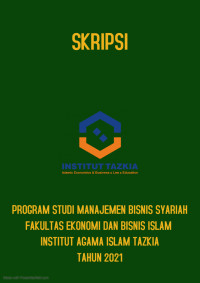Electronic Resource
Measuring Peer to Peer Fintech Effect on Indonesia's Financial Inclusion and Economic Growth:An Empirical Analysis
Purpose : Employing special agent theory of financial inclusion, this study
aims to analyze the effect of variable asset and number of
conventional and sharia peer to peer fintech company to financial
inclusion and economic growth in Indonesia with empirical data.
Methodology : The study uses a path analysis, wherein the secondary data
collected from Financial Services Authority of Indonesia’s Fintech
Lending Statistics, Central Bank of Indonesia’s Financial System
Statistics, and Organization for Economic Co-operation and
Development.
Findings : The results indicate that Asset and Number of Shariah P2P
Financing have a significant positive effect on financial inclusion
and has a positive but not significant effect on economic growth.
The findings also suggest that Number of Conventional P2P
Lending variable has negative but not significant effect on financial
inclusion and has negative significant effect on economic growth in
Indonesia. Whereas Asset of Conventional P2P Lending variable
has positive but not significant effect on financial inclusion and
economic growth in Indonesia. Finally, this study provides empirical
evidence that Financial Inclusion has positive significant effect on
economic growth in Indonesia.
Availability
Detail Information
- Series Title
-
-
- Call Number
-
REF 338.9598 FUA m
- Publisher
- Bogor : IAI Tazkia., 2021
- Collation
-
MBS
- Language
-
English
- ISBN/ISSN
-
NIM.17101004
- Classification
-
338.9598
- Content Type
-
-
- Media Type
-
-
- Carrier Type
-
-
- Edition
-
-
- Subject(s)
- Specific Detail Info
-
-
- Statement of Responsibility
-
Salma Dliya Fuady
Other version/related
No other version available
File Attachment
Comments
You must be logged in to post a comment

 Computer Science, Information & General Works
Computer Science, Information & General Works  Philosophy & Psychology
Philosophy & Psychology  Religion
Religion  Social Sciences
Social Sciences  Language
Language  Pure Science
Pure Science  Applied Sciences
Applied Sciences  Art & Recreation
Art & Recreation  Literature
Literature  History & Geography
History & Geography